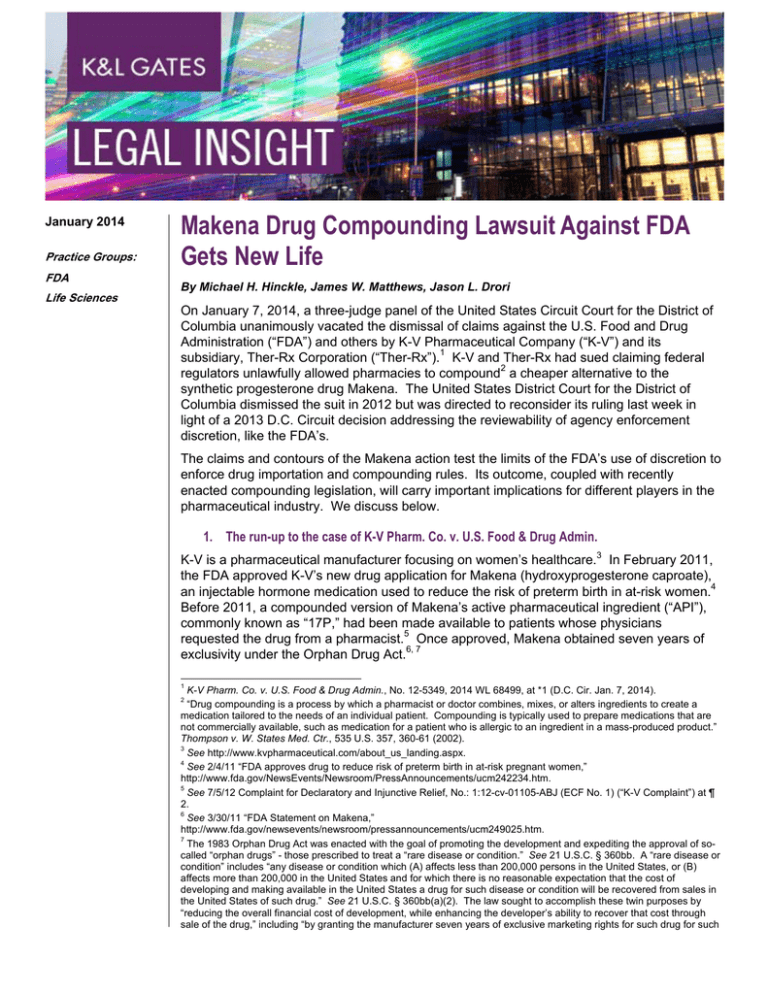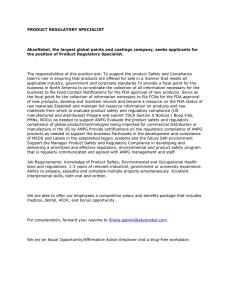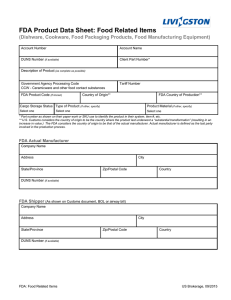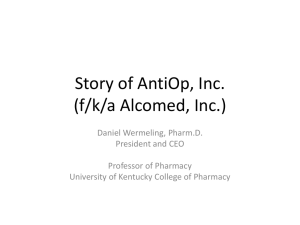
January 2014
Practice Groups:
FDA
Makena Drug Compounding Lawsuit Against FDA
Gets New Life
By Michael H. Hinckle, James W. Matthews, Jason L. Drori
Life Sciences
On January 7, 2014, a three-judge panel of the United States Circuit Court for the District of
Columbia unanimously vacated the dismissal of claims against the U.S. Food and Drug
Administration (“FDA”) and others by K-V Pharmaceutical Company (“K-V”) and its
subsidiary, Ther-Rx Corporation (“Ther-Rx”).1 K-V and Ther-Rx had sued claiming federal
regulators unlawfully allowed pharmacies to compound2 a cheaper alternative to the
synthetic progesterone drug Makena. The United States District Court for the District of
Columbia dismissed the suit in 2012 but was directed to reconsider its ruling last week in
light of a 2013 D.C. Circuit decision addressing the reviewability of agency enforcement
discretion, like the FDA’s.
The claims and contours of the Makena action test the limits of the FDA’s use of discretion to
enforce drug importation and compounding rules. Its outcome, coupled with recently
enacted compounding legislation, will carry important implications for different players in the
pharmaceutical industry. We discuss below.
1. The run-up to the case of K-V Pharm. Co. v. U.S. Food & Drug Admin.
K-V is a pharmaceutical manufacturer focusing on women’s healthcare.3 In February 2011,
the FDA approved K-V’s new drug application for Makena (hydroxyprogesterone caproate),
an injectable hormone medication used to reduce the risk of preterm birth in at-risk women.4
Before 2011, a compounded version of Makena’s active pharmaceutical ingredient (“API”),
commonly known as “17P,” had been made available to patients whose physicians
requested the drug from a pharmacist.5 Once approved, Makena obtained seven years of
exclusivity under the Orphan Drug Act.6, 7
1
K-V Pharm. Co. v. U.S. Food & Drug Admin., No. 12-5349, 2014 WL 68499, at *1 (D.C. Cir. Jan. 7, 2014).
“Drug compounding is a process by which a pharmacist or doctor combines, mixes, or alters ingredients to create a
medication tailored to the needs of an individual patient. Compounding is typically used to prepare medications that are
not commercially available, such as medication for a patient who is allergic to an ingredient in a mass-produced product.”
Thompson v. W. States Med. Ctr., 535 U.S. 357, 360-61 (2002).
3
See http://www.kvpharmaceutical.com/about_us_landing.aspx.
4
See 2/4/11 “FDA approves drug to reduce risk of preterm birth in at-risk pregnant women,”
http://www.fda.gov/NewsEvents/Newsroom/PressAnnouncements/ucm242234.htm.
5
See 7/5/12 Complaint for Declaratory and Injunctive Relief, No.: 1:12-cv-01105-ABJ (ECF No. 1) (“K-V Complaint”) at ¶
2.
6
See 3/30/11 “FDA Statement on Makena,”
http://www.fda.gov/newsevents/newsroom/pressannouncements/ucm249025.htm.
7
The 1983 Orphan Drug Act was enacted with the goal of promoting the development and expediting the approval of socalled “orphan drugs” - those prescribed to treat a “rare disease or condition.” See 21 U.S.C. § 360bb. A “rare disease or
condition” includes “any disease or condition which (A) affects less than 200,000 persons in the United States, or (B)
affects more than 200,000 in the United States and for which there is no reasonable expectation that the cost of
developing and making available in the United States a drug for such disease or condition will be recovered from sales in
the United States of such drug.” See 21 U.S.C. § 360bb(a)(2). The law sought to accomplish these twin purposes by
“reducing the overall financial cost of development, while enhancing the developer’s ability to recover that cost through
sale of the drug,” including “by granting the manufacturer seven years of exclusive marketing rights for such drug for such
2
Makena Drug Compounding Lawsuit Against FDA Gets
New Life
Apparently in response to negative media coverage and resulting pressure from members of
Congress over Makena’s high list price, the FDA announced in March 2011 that
[i]n order to support access to this important drug, at this time
and under this unique situation, FDA does not intend to take
enforcement action against pharmacies that compound
hydroxyprogesterone caproate based on a valid prescription
for an individually identified patient unless the compounded
products are unsafe, of substandard quality, or are not being
compounded in accordance with appropriate standards for
compounding sterile products.8
In October 2011, K-V provided information to the FDA that it claimed raised concerns about
the potency and purity of the APIs in samples of compounded 17P.9 In a June 2012 press
release, the FDA said that “the analysis of this limited sample of compounded
hydroxyprogesterone caproate products and APIs did not identify any major safety
problems.”10 It nonetheless cautioned that “[c]ompounding large volumes of drugs that are
copies of FDA-approved drugs circumvents important public health requirements,” and that
“it is applying its normal enforcement policies for compounded drugs to compounded
hydroxyprogesterone caproate.”11
A month later, K-V and Ther-Rx filed a four-count complaint in federal court seeking a
panoply of declaratory and injunctive relief based on the FDA’s alleged unwillingness to
pursue compounders of 17P.12 The failure to do so, they claimed, violated the Administrative
Procedure Act (“APA”) and several provisions of the Federal Food, Drug, and Cosmetic Act
(“FDCA”).13 In particular, they alleged the government’s “policy of non-enforcement” against
the import of 17P’s APIs and its compounding were “effectively approving, inviting,
encouraging, and permitting . . . direct nationwide competition between an entire class of
unapproved compounded drug products . . . and an approved orphan drug product.”14
2. The district court dismisses the case citing the FDA’s “enforcement discretion”
On September 6, 2012, the United States District Court for the District of Columbia
dismissed K-V and Ther-Rx’s complaint, relying primarily on the United States Supreme
Court’s 1985 decision in Heckler v. Chaney.15 In Chaney - which, coincidentally, involved a
challenge to the FDA’s enforcement discretion - the Court held that an agency’s refusal to
take an investigative or enforcement action is presumptively unreviewable under the APA.16
“[A]n agency’s decision not to take enforcement action should be presumed immune from
judicial review under § 701(a)(2) [of the APA]. For good reasons, such a decision has
[rare] disease or condition.” See Genentech, Inc. v. Bowen, 676 F. Supp. 301, 303 (D.D.C. 1987) (brackets in original;
internal quotations omitted).
8
See footnote 5, supra.
9
See 11/8/11 “FDA Statement on Makena,”
http://www.fda.gov/NewsEvents/Newsroom/PressAnnouncements/ucm279098.htm.
10
See 6/15/12 “Updated FDA Statement on Compounded Versions of hydroxyprogesterone caproate (the active
ingredient in Makena),” http://www.fda.gov/NewsEvents/Newsroom/PressAnnouncements/ucm308546.htm.
11
See id.
12
See K-V Complaint at ¶ 1.
13
K-V Pharm. Co. v. U.S. Food & Drug Admin., 889 F.Supp.2d 119, 123 (D.D.C. 2012), reversed and remanded by K-V
Pharm. Co. v. U.S. Food & Drug Admin., 2014 WL 68499, at *1.
14
See K-V Complaint at ¶¶ 15; 22.
15
470 U.S. 821 (1985).
16
See id. at 832.
2
Makena Drug Compounding Lawsuit Against FDA Gets
New Life
traditionally been committed to agency discretion, and we believe that the Congress enacting
the APA did not intend to alter that tradition.”17
The APA’s presumption of unreviewability, however, is a rebuttal one. “[T]he presumption
may be rebutted where the substantive statute has provided guidelines for the agency to
follow in exercising its enforcement powers.”18 Where “the agency has consciously and
expressly adopted a general policy that is so extreme as to amount to an abdication of its
statutory responsibilities,” that, too, “might indicate that such decisions were not committed to
agency discretion.”19 This reflected the judgment by Congress not to “set agencies free to
disregard legislative direction in the statutory scheme that the agency administers.”20
The D.C. federal district court determined that “plaintiffs’ claims . . . fall squarely within the
Chaney presumption of unreviewability,” and that “this case is fundamentally an effort to get
the Court to direct and oversee the FDA’s enforcement activities, and that it cannot do.”21
The FDA’s March statement, it held, was not tantamount to a statement of a general
enforcement policy capable of judicial review because of, among other things, its
consideration of the individual circumstances surrounding the compounding of 17P.22 That
made it “the sort of ad hoc, context-bound nonenforcement pronouncement that . . . would
inherently implicate an agency’s unreviewable enforcement discretion.”23
3. A Potential Silver Lining?
Ten months after K-V and Ther-Rx’s loss in the D.C. district court, the D.C. Circuit took up
the case of Cook v. Food & Drug Admin.,24 which involved allegations by death row
prisoners that the FDA had wrongly failed to refuse importation of unapproved and/or
misbranded sodium thiopental, the first in a sequence of drugs used in the execution of state
prisoners and currently an unapproved drug.25 The FDA fell back on Chaney, arguing that
its decision to release sodium thiopental shipments destined for correctional facilities was
committed to agency discretion and thus was unreviewable under the APA.26
But the D.C. Circuit disagreed and decided review was appropriate. It recognized that “[t]he
FDCA imposes mandatory duties upon the agency charged with its enforcement,” i.e., the
FDA, including “precisely when the agency must determine whether a drug offered for import
appears to violate the FDCA, and what the agency must do with such a drug”; namely, if and
when the FDA must refuse admission to any drug that appears to violate the law’s
substantive prohibitions.27 Accordingly, “[b]ecause these are clear statutory guidelines for
the agency to follow in exercising its enforcement powers . . . the FDA’s compliance with §
381(a) [was] subject to judicial review under the standards of the APA.”28 On the merits, the
appeals court ruled that “[t]he FDA acted in derogation of [its] duties by permitting the
importation of thiopental, a concededly misbranded and unapproved new drug, and by
17
See id.
See id. at 832-33.
19
See id. at 833, n.4.
20
See Chaney, 470 U.S. at 833.
21
K-V Pharm. Co., 889 F.Supp.2d at 133.
22
See id. at 136.
23
See id. at 137.
24
733 F.3d 1 (D.C. Cir. 2013).
25
See id. at 3.
26
See id. at 6-7.
27
See id. at 7; 12.
28
See id. at 10 (citing Chaney, 470 U.S. at 833) (internal quotations omitted).
18
3
Makena Drug Compounding Lawsuit Against FDA Gets
New Life
declaring that it would not in the future sample and examine foreign shipments of the drug
despite knowing they may have been prepared in an unregistered establishment.”29
4. What Happens Next?
In an unpublished decision issued January 7, the D.C. Circuit remanded K-V Pharm. Co. for
reconsideration in light of Cook and the Drug Quality and Security Act (“DQSA”),30 enacted
November 27, 2013.31 Cook’s application of the FDA’s duties under the FDCA’s provisions
governing importation would seem to make reviewable the FDA’s decision to allow
unapproved drug ingredients into the United States from at least some unregistered
manufacturers/suppliers. Ultimately, though, whether and how Cook and the DQSA help K-V
and Ther-Rx is anybody’s guess. One way or another, resolution of the interplay between
the APA and FDCA will further define the boundaries of the FDA’s enforcement discretion in
the important areas of drug compounding and importation. K&L Gates LLP will report on
further developments as they unfold.
Authors:
Michael H. Hinckle
James W. Matthews
Jason L. Drori
michael.hinckle@klgates.com
+1. 919.466.1115
james.matthews@klgates.com
+1. 617.261.3197
jason.drori@klgates.com
+1. 617.951.9143
Anchorage Austin Beijing Berlin Boston Brisbane Brussels Charleston Charlotte Chicago Dallas Doha Dubai Fort Worth Frankfurt
Harrisburg Hong Kong Houston London Los Angeles Melbourne Miami Milan Moscow Newark New York Orange County Palo Alto Paris
Perth Pittsburgh Portland Raleigh Research Triangle Park San Diego San Francisco São Paulo Seattle Seoul Shanghai Singapore Spokane
Sydney Taipei Tokyo Warsaw Washington, D.C. Wilmington
K&L Gates practices out of 48 fully integrated offices located in the United States, Asia, Australia, Europe, the Middle East and South
America and represents leading global corporations, growth and middle-market companies, capital markets participants and
entrepreneurs in every major industry group as well as public sector entities, educational institutions, philanthropic organizations and
individuals. For more information about K&L Gates or its locations, practices and registrations, visit www.klgates.com.
This publication is for informational purposes and does not contain or convey legal advice. The information herein should not be used or relied upon in
regard to any particular facts or circumstances without first consulting a lawyer.
©2013 K&L Gates LLP. All Rights Reserved.
29
See Cook, 733 F.3d at 12.
Pub. L. No. 113-54, 127 Stat. 587 (2013). The DQSA was the combination of compounding and supply chain security
legislation originally proposed by the Senate Committee on Health Education, Labor, and Pensions and the House of
Representatives. The DQSA consists of two independent acts - the Compounding Quality Act and the Drug Supply Chain
Security Act. The first creates a voluntary compliance regime that allows compounding pharmacies to register with the
FDA as “outsourcing facilities” and meet certain best practices requirements similar to drug manufacturers to be exempt
from the FDCA’s approval and labeling requirements. See “FDA Implementation of the Compounding Quality Act,”
http://www.fda.gov/drugs/guidancecomplianceregulatoryinformation/pharmacycompounding/ucm375804.htm. The second
requires the FDA to implement an electronic, interoperable system to identify and trace certain prescription drugs as they
are distributed in the United States, including through unique product identifiers on individual drug packages and product
and transaction information at each sale with lot level information. See “Drug Supply Chain Security Act,”
http://www.fda.gov/drugs/drugsafety/drugintegrityandsupplychainsecurity/drugsupplychainsecurityact/default.htm.
31
K-V Pharm. Co., 2014 WL 68499, at *1.
30
4






